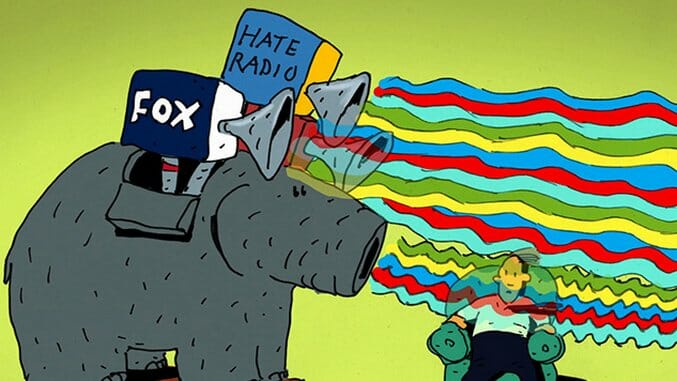The Brainwashing of My Dad

In a case of uncanny timing, Jen Senko’s prescient documentary The Brainwashing of My Dad arrives to recount the rise of right-wing cable news and conservative talk radio through a relatable personal family story and a refresher on recent American history. Through anecdotal and social science research, Senko’s film also provides much-needed insight as to why Donald Trump’s caustic discourse and demagoguery is catnip for so many people.
Senko’s film begins with her father’s story. By all accounts, Frank Senko, a World War II veteran, was an affable, funny, considerate guy and an apolitical Kennedy Democrat in his younger days. When his daily commute got longer, he began listening to talk radio, particularly Rush Limbaugh (whom he calls “one of my heroes”), and his political views turned 180 degrees. He began to rail against the poor and disenfranchised, minorities, homosexuals, and the worst of the lot: Democrats. The filmmaker says that her dad’s intolerance only intensified when he discovered Fox News, and in interviews with immediate family members and others, they all confirm that he became pretty much unbearable. It was impossible to talk to him about socio-economic issues rationally; it was his way or the highway. Discussions would often end in arguments or bitterness. His family threatened to block his email address if he continued to forward political propaganda.
In looking into her dad’s obsession with Fox News and conservative media, Senko discovers that her family is far from alone in their experience. During the film’s Kickstarter campaign, she finds “a real phenomenon” of loved ones who became “enraged and unaccessible (sic) after listening to right-wing media.” Senko talked to dozens, if not hundreds, of people in similar situations. “My brother became very fact resistant,” says one interviewee.
Just when we begin to dread that the film will drone on with more in-person or Skype interviews of people talking about their cranky grandfathers or crazy aunts and uncles, the film transitions from a personal narrative to a history of American politics and media from the latter half of the 20th century onward. In between standard talking head interviews, Senko’s film uses an assortment of home movie clips, vintage stock photos, news footage, infographics, terrific animation by Academy Award nominee Bill Plympton, and voiceovers from her and actor Matthew Modine, one of the film’s producers, to create an accessible entry to a complex topic. Is the film fair and balanced? Probably as much as Fox News is—but it’s thought-provoking and eye-opening nonetheless.
-

-

-

-

-

-

-

-

-

-

-

-

-

-

-

-

-

-

-

-

-

-

-

-

-

-

-

-

-

-

-

-

-

-

-

-

-

-

-

-








































